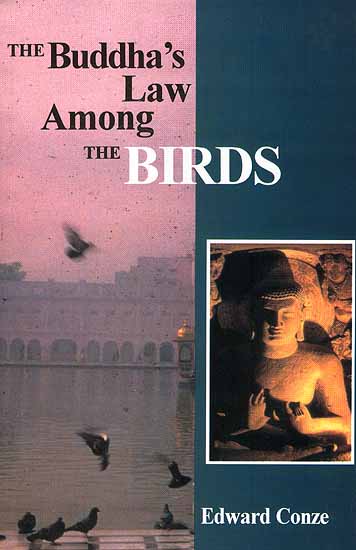
Author: Unknown
Translation and Commentary by Edward Conze, 2002 edition
No matter how frustrating or hopeless certain points in life may feel, two statements of faith keep Buddhists humble and confident in the Buddhist answer. Firstly, the Buddha loves all beings and wants them to find happiness and liberation. Secondly, no matter how long or how many lifetimes it takes, he will forever appear in the worlds and the cosmos to guide us.
This message has been echoed throughout the aeons in many different civilizations and cultures. One of these was Tibet, where an unknown lama wrote a marvelous poem called The Buddha’s Law Among the Birds. The preface by its unknown author, who was most likely a mystic lama, begins thus: “The Lord Buddha has said: In the language of angels, of serpents, of fairies, in the speech of the demons, the talk of the humans, in them all I’ve expounded the Dharma’s deep teachings, and in any tongue that a being may grasp them.” The Buddha’s Law Among the Birds records a series of teachings given by the Lord Avalokiteshvara to an enormous assembly of birds, who come from all the world’s corners to listen to him. The bodhisattva himself is in the avian form of a cuckoo, and the uniqueness of the poem lies with the instruction of the birds into the Buddhist way of life. The translation I have here with me is by Edward Conze and was published by Motilal Banarsidass. As far as I know, this is the only English translation that is available. This story is therefore an unusual treasure, an inspiration in a very Buddhist sense of the word.
The language and style of this poem is not sophisticated, and there are few words in book narrative that will prompt much head-scratching: in other words, there is little jargon. The primary audience is intended (as it probably was in Tibet) for the general reader who is interested in Buddhist ethics, morality and/or literature. As Conze writes in his introduction, “Both language and ideas mark this as a popular book, a piece of folk literature, destined for peasants and nomadic herdsmen. More than many a learned treatise, it conveys to us… what it feels like to be a Buddhist” (p. 9).
Unlike ancient sutras that make a claim to authority as “threads of the Buddha’s word” (buddhavacana), Avalokiteshvara has some very “subversive” and practical advice for modern readers suspicious of authority of any kind (especially the political). Consider the Jackdaw in the congregation, who bends his head and warns: “Leave behind that pious talk which leaves your own nature unchecked! Leave behind those brave sayings wherein fine words conceal an evil heart… Leave behind that urge for greatness when you cannot bear its burden! Leave behind those admonitions when you have not learnt to listen… Leave behind those religious acts which are mere hypocrisy!” (p. 27) And right afterward, the Owl echoes the Jackdaw by ruffling her feathers and singing: “A priest without morals – what misery! An old lama without judgment – what misery… A teacher without virtues – what misery! Knowing the misery that all these things can bring, avoid them!” (p. 27 – 8)
The teachings of the birds range from these arresting exhortations to the outright adorable. In one instance, I was forced to imagine a Kestrel expounding the Dharma whilst cawing at the same time: “Observe this man who ignores the fruits of his evil deeds. He will surely go to hell, Ki ki. Observe this man who calculates on staying here for ever. He will surely be ensnared by death, Ki ki” (p. 32). It is, of course, true that the Buddha speaks to all beings in limitless ways of communication. It just feels unusual to imagine the reverse.
Due to the mysterious origins and author of this poem, it really cannot be evaluated in any way except by its spiritual import, its stylistic, literary coherence, and its general applicability to our daily lives as Buddhists. As I have already mentioned, this charming story and its translation by Conze deserves nothing less to be a valued item on your Buddhist bookshelf, an additional echo from the sages past who understood the Buddha’s universal compassion. I would highly recommend this book to all readers interested in Buddhist literature and the universalism of Buddhist soteriology (doctrines of salvation).






